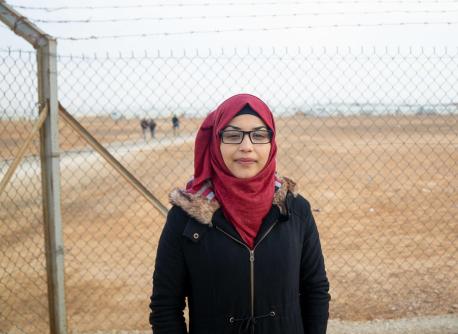
Growing Up in a Refugee Camp, Dreaming of the Stars
For children displaced by conflict, the world can be a frightening place and "home" a concept filled with longing and uncertainty.
In 2014, a 12-year-old girl named Bodoor and her family were forced out of their home by political violence in Syria. "My life in Syria was normal. I went to school every day," Bodoor, now 18, recalls. "It was beautiful because it was quiet — there was no fear. Then the war happened."
With Syria's infrastructure crumbling and their children's safety in doubt, her parents made the difficult decision to leave their country behind. They traveled to Jordan, and home became a dirt-floored shelter with no water or electricity in the newly opened Azraq Refugee Camp.
"When I feel sad or stressed, I look to the sky, because I want to escape from the bad things happening on Earth," Bodoor confided in a video made when she was 17. Staring up at the night sky, she imagined a brighter future for herself: she would study astronomy and, one day, become Syria's first woman astronaut.
18-year-old Bodoor dreams of becoming Syria's first woman astronaut
Dottie Metcalf-Lindenburger, an American astronaut who served as a mission specialist on the Space Shuttle in 2010, saw Bodoor's video, and sent her a surprise video reply. "Dear Bodoor, this video is an encouragement from me to you," she said.
"I am encouraged by your strength to have flown Syria and be in Jordan learning and trying your absolute best to understand astronomy. I was a little girl once, dreaming about going to space, and I wasn't even sure that was really possible. But I think if you remain curious and you pursue your education, you will accomplish your big dreams."
UNICEF supports education programs for children growing up in refugee camps

After her family moved to Azraq, Bodoor resumed her studies at a UNICEF-supported remedial education center. "I am lucky to go to school," she says. "Many children didn't get that chance."
Now the girl who grew up dreaming of planets and galaxies is in her last year of school, still studying hard and hoping she will be able to go to university to pursue her goals. Her family has moved into one of Azraq's corrugated metal modular houses. There is a carpet on the floor, and her books are neatly piled behind a curtain.
The camp's "temporary" housing is home to more than 36,000 Syrian refugees, more than half of them children. An entire generation is growing up in Azraq, and their futures remain fragile. "It is not easy, and it is not a normal life for children," says Bodoor.
An entire generation of Syrian children are growing up in refugee camps — UNICEF is helping them get a healthy start in life
Since the camp opened in 2014, UNICEF has helped more than 22,000 children in Azraq get an education, a healthy start in life and the opportunity to reach their full potential.
"The biggest challenge for girls my age is when their family makes them get married without completing their studies," says Bodoor. "They say studying is not good for girls or will not give them anything. The only way for a girl is to belong in her husband's home. But I say they are completely wrong. With studying, we get power and are more useful to societies."
Bodoor's parents are fiercely proud of their daughter and her dreams. "When she gets an education, she will not be under anyone's shadow or control," says Bodoor's mother. "When she gains an education, she will open the locks of the world and face any challenges that come her way, live independently and have her own opinions."
As the Syrian civil war moves into its tenth year, UNICEF and partners will continue working to protect children in Syria and across the region, to help them cope with the impact of conflict and to resume their childhoods. UNICEF provides improved access to education and psychosocial support services for traumatized children and caregivers, and delivers critical humanitarian assistance in hard-to-reach places.
Top photo: Bodoor and her family fled Syria's civil war in 2014. Since then, she has lived in Azraq Refugee Camp in Jordan, where she attends a UNICEF-supported school. Her favorite subject is science. She hopes to go to university to study astronomy and become Syria's first woman astronaut. © UNICEF/UN0263759/Herwig
HOW TO HELP
There are many ways to make a difference
War, famine, poverty, natural disasters — threats to the world's children keep coming. But UNICEF won't stop working to keep children healthy and safe.
UNICEF works in over 190 countries and territories — more places than any other children's organization. UNICEF has the world's largest humanitarian warehouse and, when disaster strikes, can get supplies almost anywhere within 72 hours. Constantly innovating, always advocating for a better world for children, UNICEF works to ensure that every child can grow up healthy, educated, protected and respected.
Would you like to help give all children the opportunity to reach their full potential? There are many ways to get involved.



